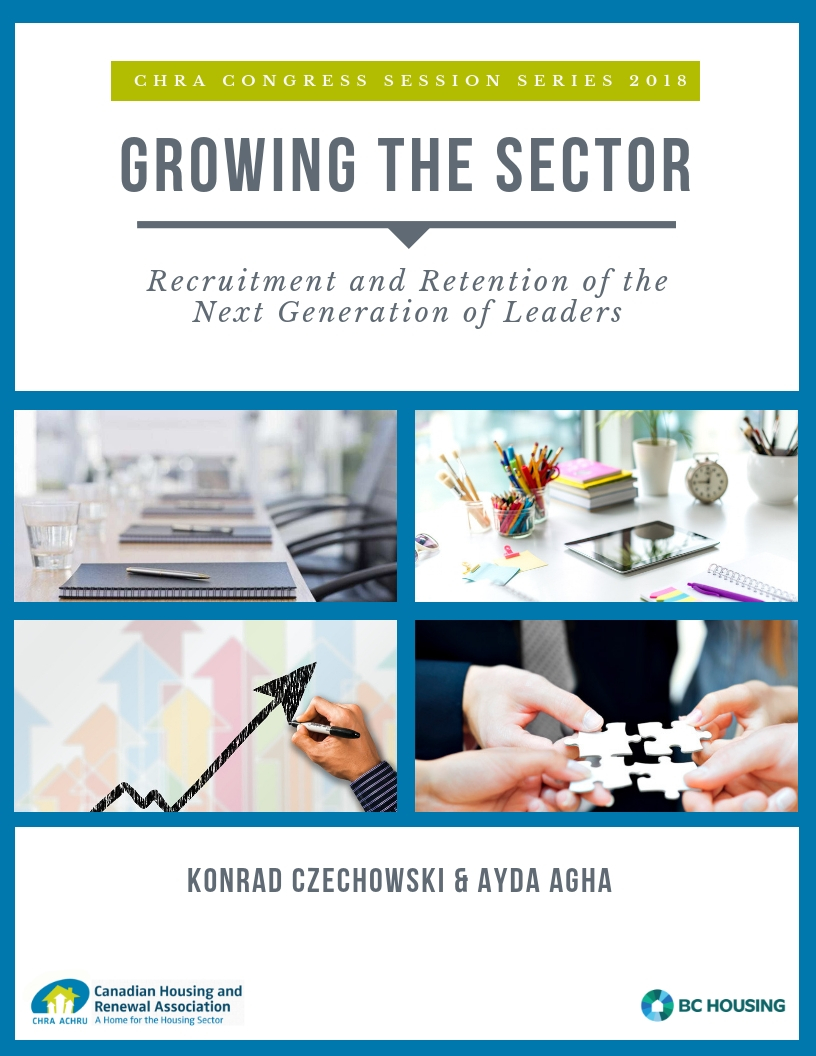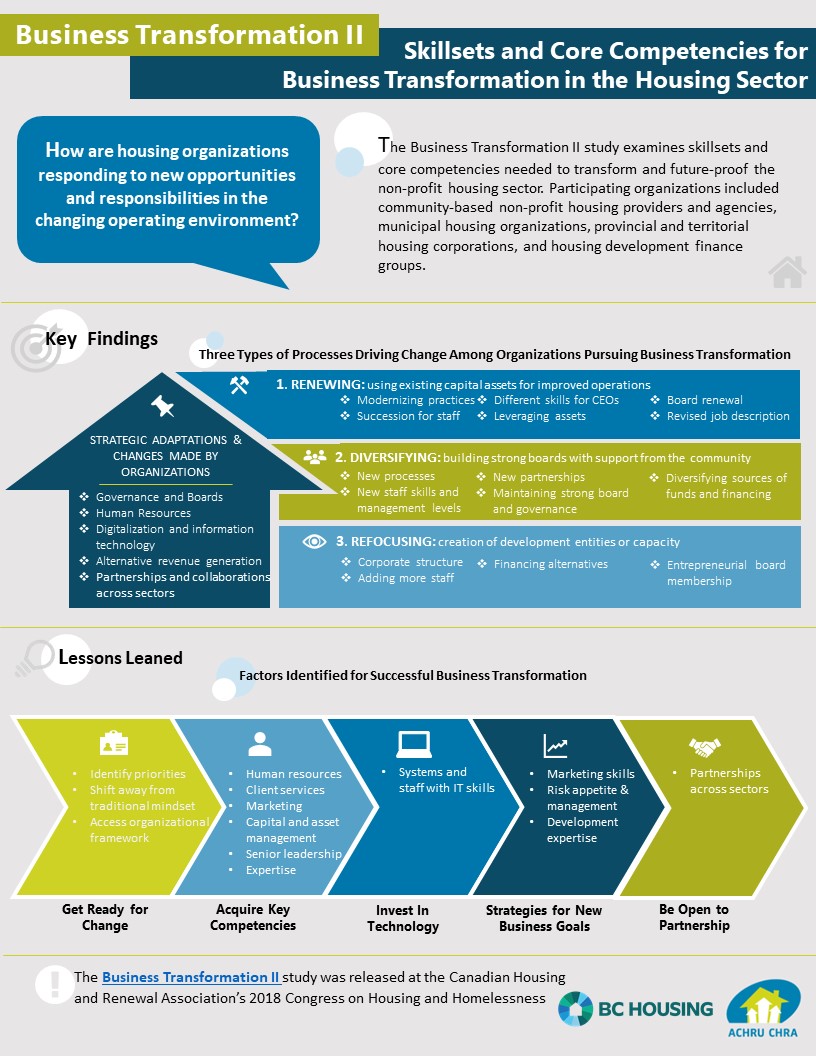 |
|---|
| Download the PDF version |
| Download the PDF infographic |
Summary authored by Konrad Czechowski, M.A. Experimental Psychology, Ph.D. Candidate Clinical Psychology, University of Ottawa & Ayda Agha, MSc. Community Health, Ph.D. Candidate Experimental Psychology, University of Ottawa
Panelists
Introduction
Housing Partnership Canada is a collaboration of Canada’s housing leaders, operating as a peer-based network for senior housing practitioners of influential organizations, which have a demonstrated commitment to innovation and sharing business ideas.
In 2015, Housing Partnership Canada commissioned a study aimed at exploring emerging business practices and new approaches with regards to the development, operation, and sustainability of social housing in Canada. The Business Transformation I study 1(PDF) demonstrates certain mechanics at play in housing organizations where real innovation is happening; some of these organizations are entrepreneurial, making impactful changes within.
The findings led to the commission of a second study, Business Transformation II 2(PDF), aimed at digging deeper to understand what factors contribute to business sustainability. Ultimately, the objective of the study was to clarify what skills and core competencies are required to sustainably change an organization’s operating environment, whether and when tolerance for risk should be adjusted, and what governance and internal organizational capacities are needed for an organization to remain sustainable in the long term.
Simply put, the study aimed to investigate how organizations “future-proof” their businesses, to ultimately set themselves up for long-term success.
Business Transformation II – A Study Exploring Factors that Drive Business Sustainability
When analyzing the Canadian literature, study authors found that little had previously been done to profile the community housing sector in Canada with regards to how changes are made to ensure sustainability. This study aimed to fill that gap. As illustrated in Figure 1, findings were based on 21 key informant interviews and 213 completed online surveys with representatives from a mixture of small, medium, and large organizations, 40 per cent of whom reported to have been making significant organizational changes.

Figure 1: Infographic, skillsets and core competencies for Business Transformation in the housing sector
Governance and Boards
One third of the organizations that participated in the BTII study reported they were making changes to their board memberships and board priorities. This included term limits, ranges of skills and priorities required by board members, and board composition. Core competencies within boards included having business experience as well as involving individuals from the community.
Another issue often brought up by study participants was risk tolerance – organizations were willing to take little risk and often emphasized their taking of “smart risks” that involve creative strategic planning. Importantly, this includes the capacity to justify to the board why certain risks should be taken.
Greg Dewling of Capital Region Housing Corporation (CRHC) in Alberta spoke to his experience in organizational change and transformation, highlighting that on the CRHC Board of Directors, seniority alone is insufficient to get individuals promoted (but is considered). Their organization shifted to a merit-based system, having found it to be more motivating.
Mr. Dewling emphasized the importance of board members having the capacity and comfort to ask the right productive questions to encourage discussion and challenge ideas. In terms of longevity, board members should not remain on a board for more than several years at a time as this may limit an individual’s ability to provide productive input or perspective. “Once you’re there too long, you know too much, it’s not good governance.”
Human Resources
BTII found that as organizations diversify, they also begin to think about building in-house development capacity, such as new types of staff and skill-sets needed. To foster development in diversifying business, consideration is placed on current in-house expertise before making new human resources investments. Purposeful change is created when there exists a clear vision guiding the right human resource investments needed to support an organization’s business.
Governance should equally have weight and vision, assessing future risks and challenges to mandate appropriate human resources change, including the importance of outsourcing if sufficient expertise does not exist in-house. Outsourcing is particularly useful if certain skill sets are required for transient tasks where hiring permanent staff is not necessary.
Digitalization and Information Technology
Lisa Oliveira of Housing Services Corporation highlighted the challenges faced when organizations embrace and invest in Information Technology. The pace at which change was made for many organizations is not fast enough. In addition to specialized training and integration of new IT, a longevity period is necessary to really make a difference. Lack of dedicated staff with the capacity to support new IT systems often emerges as an issue.
As a counter-measure, the BTII study found that organizations adapted by making IT proficiency a key competency for new hires. Importance was placed on implementing appropriate IT investments promptly (with outside support and expertise when necessary). Putting off IT investments could lead to greater problems down the road, including ballooning costs to deal with compounded issues. “Pay now or pay later, later is always more expensive.”
Considerations whether to outsource digitization and integration of IT systems include the size of the organization, whether expertise exist in-house, and whether there is a long-term need for the specific expertise in question. As systems become more complex, outsourcing is increasingly likely to be necessary. A shared services model, where housing organizations share various IT services is one effective and useful option to meet organizational needs. However, in instances where there exist unique organizational needs, a shared services model may be too complex and difficult to implement.
Alternative Revenue Generation
The BTII study revealed that 50 per cent of surveyed organizations were exploring alternative revenue generating opportunities such as joint ventures, collaborative development approaches, pooling resources with partners, and diversifying toward new housing products or services. Organizations can also use existing in-house skills or supplement employee salaries with other revenue streams by providing consulting services or delivering financial services to other organizations.
Provision of consulting services can be an effective way for an organization to draw on its in-house expertise or experience to generate an alternative revenue stream. When drawing on existing in-house expertise, additional training is often not required to provide consulting services, and marketing of such services need not consume a lot of resources.
For example, an organization can provide consulting services for other similar organizations implementing a new system, such as a new IT system as discussed in the previous section. An organization can leverage their experience in implementing a new system or draw on in-house IT experience other organizations may not have. Such alternate revenue streams can also be used to supplement salaries of individuals providing the services.
Partnerships and Collaborations Across Sectors
The BTII study highlighted how organizations explore partnerships and cross-sectoral collaboration as an approach to respond to the changing environment and needs of affordable housing tenants. Changes taking place across sectors have both direct and indirect impacts and implications for business transformation. To address theses changes, partnership approaches seek to engage with multiple partners, such as Indigenous Peoples, municipalities, and service organizations, to help identify shared goals and opportunities for collaboration.
Housing providers and agencies often provide services beyond housing, with crossovers into social services and supports and health. These crossovers require a broader set of community development skills due to the dissimilar and diverse service models in each sector, and therefore includes a better understanding of the business models best suited to support multi-service agencies.
In Summary
The Canadian Housing and Renewal Association’s Congress 2018 workshop “Growing the Sector: Recruitment and Retention of the Next Generation of Leaders” highlighted effective strategies organizations are presently using to achieve long-term sustainability. In their discussion of important organizational priorities that include renewal, diversification, and corporate sustainability, the workshop panellists supplemented results from the Business Transformation II study with their workplace experiences in the housing sector.
Successful organizational sustainability includes improving governance through fostering purposeful change, such as the “smart” selection of incoming board members and investing in the right kind of human resources to meet organizational needs both in the short and long run. An important part of improving governance includes making prompt decisions when the time comes to digitize and integrate new IT systems, a move which requires a high level of expertise that may necessitate outsourcing if resources are unavailable in-house. Organizations are also using innovative methods to generate revenue, such as pooling resources and providing consulting services, to ensure organizational viability and increase sector collaboration.
Endnotes
1. Business Transformation: Promising Practices for Social and Affordable Housing in Canada. (PDF) Housing Partnership Canada (2015).
2. Skillsets and Core Competencies to Facilitate Business Transformation in the Non-Profit Community Housing Sector. (PDF) Housing Partnership Canada (2018).
